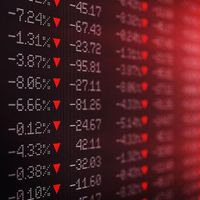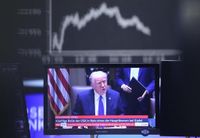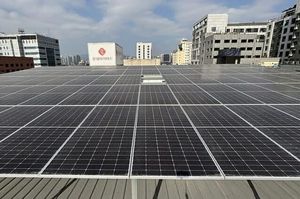On April 4, 2025, the Milan Stock Exchange faced a significant downturn, marking it as the worst-performing market in Europe, with the FTSE Mib index plummeting over 5.8% at one point during the trading day. This sharp decline was primarily driven by heavy losses in the banking sector, which has been under intense pressure following the announcement of reciprocal tariffs by U.S. President Donald Trump just a day earlier.
According to data from the Italian Stock Exchange, trading value reached 5.64 billion euros, a staggering increase of 94.15% compared to the previous session's 2.91 billion euros. However, this surge in trading volume did not translate into positive performance for the majority of stocks. Out of 566 stocks traded, 445 closed in negative territory, while only 96 managed to gain.
As the day progressed, the banking sector was hit particularly hard, with shares of major banks like Unicredit and Monte dei Paschi di Siena dropping nearly 10%. Reports indicated that the banking sector, which typically thrives in a stable global economy, is now facing increased volatility due to the uncertainty surrounding the new trade policies. Experts from KTS Finance noted, "Banks, which traditionally benefit from a stable global economy, may find themselves facing greater volatility, with repercussions also on their earnings forecasts for the coming quarters." This sentiment was echoed by Premier Giorgia Meloni, who expressed her concern about the tariffs, stating, "I am obviously worried, it is a problem that must be solved. I wouldn't make the catastrophe that I'm hearing these days, which paradoxically worries me more than the fact itself."
Wall Street also felt the impact of Trump's tariff announcement, closing down 4% and contributing to a massive loss of 2,500 billion euros across European markets within just two days. The repercussions were felt worldwide, with Tokyo's stock market reporting a decrease of 2.75% and closing at 33,780.6 points. Meanwhile, the Chinese stock market remained closed for the Ching Ming Festival on the same day.
In contrast, the Moscow Stock Exchange was one of the few markets celebrating, gaining 1.76% as it was exempt from the new tariffs targeting other countries. The exclusion of Russia was attributed to existing U.S. sanctions related to the ongoing conflict in Ukraine, which already limit significant trade between the two nations.
As the day continued, the FTSE Italia All Share index also reported a decline of 4.44%, while the FTSE Italia Mid Cap dropped by 3.1%. The overall sentiment across European markets remained negative, with Frankfurt down by 0.71%, London by 0.67%, and Paris by 0.84%.
Oil prices fell sharply as well, with Brent crude hitting its lowest level since 2021, dropping to $67.59 per barrel. The decline was exacerbated by the announcement of increased OPEC+ production, further weighing on market sentiment. The oil sector, along with banking stocks, faced significant selling pressure, leading to substantial losses for companies such as ENI and Saipem.
In the pharmaceutical sector, however, there was a glimmer of hope. Stocks like Diasorin and Amplifon managed to gain, buoyed by their exclusion from the new tariffs. Diasorin saw an increase of 2.38%, while Amplifon rose by 0.9%. This sector's relative stability provided a small buffer against the broader market's decline.
In terms of currency reactions, the euro fell below $1.1, while the dollar stabilized against major foreign currencies. The spread between Italian BTPs and German Bunds widened beyond 115 points, indicating growing concerns over Italy's fiscal stability amid the unfolding crisis.
The day's trading concluded with the FTSE Mib closing down significantly, reflecting the ongoing anxiety surrounding U.S. trade policies and their potential repercussions on the Italian economy. The overall atmosphere was one of caution, as investors braced for further developments in the global economic landscape.
As the situation continues to evolve, the Italian government and European authorities are preparing responses to mitigate the impact of the tariffs on their economies. The upcoming announcements regarding the unemployment rate and changes in employment from the United States are also expected to influence market sentiment in the coming days.






